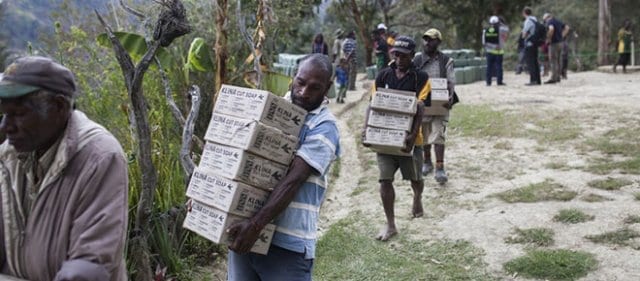Early action must be taken to halt the widespread hunger, thirst and disease taking place in New Zealand’s neighbourhood due to a super-charged El Niño.

Early action must be taken to halt the widespread hunger, thirst and disease taking place in New Zealand’s neighbourhood due to a super-charged El Niño.
Oxfam said that New Zealand must immediately act on promises made under the new global climate agreement, as evidence suggested climate change may increase the frequency of extreme El Niño occurring.
Around 4.7 million people face hunger, poverty and disease across the Pacific alone due to El Niño-related droughts, erratic rains and frosts. Globally, 18 million people are already in need of assistance.
The case for urgent action is outlined in a new Oxfam report, Early Action on Super Charged El Niño Vital to Save Lives.
Action needed
Oxfam New Zealand’s Pacific Humanitarian Manager Carlos Calderon said governments in at-risk countries are learning from slow responses to past crises and must aim to scale-up early action now, with the support of the international community, to prevent the weather event sparking major humanitarian crises.
“The last major El Niño in 1997-1998 caused widespread loss of life, damage, displacement and disease outbreaks in many parts of the world, and this year’s El Niño is expected to be even more severe,” Calderon said.
“Alarmingly, 40–50 million people around the world are expected to face hunger, disease and water shortages by early 2016.”
A Pacific-wide issue
Papua New Guinea is bearing the brunt of El Niño in the Pacific region, with the country’s National Disaster Committee reporting that up to 3 million people are at risk as crop failures force many people to cut back to eating just one meal a day. People are walking for hours to find water and face increased risk of disease due to poor hygiene.
“The warning bells are deafening. We must act now to save lives and prevent people falling further into poverty,” Calderon said.
The report finds that while Papua New Guinea, Vanuatu, Fiji, the Solomon Islands, Samoa and Tonga are experiencing worsening drought, central Pacific countries like Kiribati and Tuvalu will likely see intense rain causing flooding and higher sea levels. Drought has also taken hold across parts of Africa, Asia, the Caribbean and Central and South America.
Oxfam’s approach
Oxfam is working with a number of Pacific governments and humanitarian agencies to mitigate the effects of El Niño-related disasters, and has helped prepare communities with early response activities, including training farmers in adapting to drought conditions, and improving existing water supply and storage systems. Water purification systems are being installed in hospitals and jerry cans, and water purification tablets and soap are being distributed.
However, Oxfam is currently exploring further scale-up and coordination with governments where the impacts are most severe. The New Zealand Government has recently committed NZD$2.5 million to support Papua New Guinea and other countries in the Pacific to prepare for and mitigate respond to the effects of El Niño.
“While these funding announcements are a welcome start, it is clear that much more will be needed over coming months as the impacts of this potentially unprecedented El Niño event hit the pacific Island nations’ economies and infrastructure ,” Calderon said. “Affected governments, regional bodies and the international community must work together on early response and preparedness in the face of the unfolding crisis.”
A wake-up call
The report warns international leaders that climate change is expected to increase the odds of future El Niño events occurring.
“This is a wake-up call for those on the way home from the UN climate conference. Emissions targets must be rapidly strengthened if we are to ensure the goal of limiting warming to below 2C or 1.5C can be met. And more funding is required for vulnerable communities to adapt to increasingly unpredictable and extreme weather,” Calderon said.
Support communities affected by El Niño





